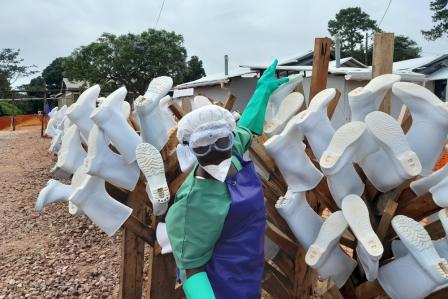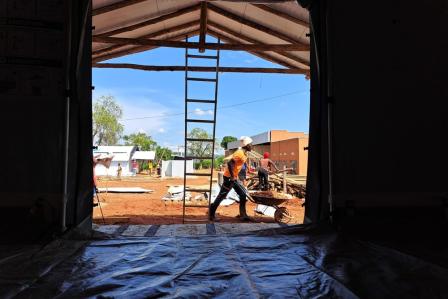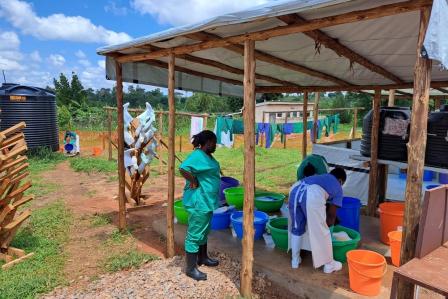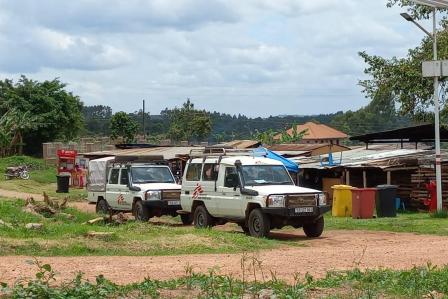Ebola: Health promotion is key
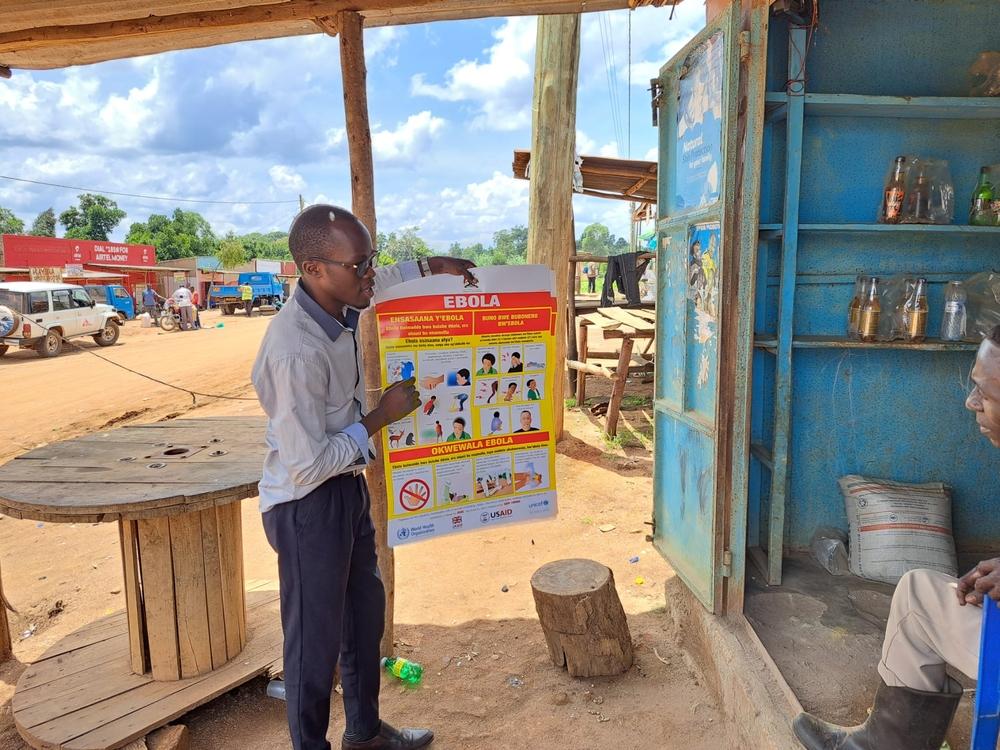
A Doctors Without Borders health promoter talks with a shop keeper in Madudu, close to the epicentre of the Ebola outbreak in Uganda. Uganda, 2022. © MSF/Sam Taylor
Doctors without Borders / Médecins Sans Frontières (MSF) started an Ebola emergency mission in Uganda, after the outbreak has been declared on September 20th. The teams are involved in supporting the Ministry of Health (MOH) in case management and are doing health promotion, a major pillar in fighting the disease. Outreach activities take place in Mubende and Kasanda, where the first cases were identified in September, and have now started in Kampala and Masaka.
Health promotion is a vital part of fighting an epidemic. In an Ebola-response, it is one of the main pillars to tackle the outbreak. Since the beginning, Doctors Without Borders has been working closely with the Ugandan Ministry of Health. Doctors Without Borders has been constructing Ebola Treatment Centres (ETCs) and smaller Ebola treatment Units (ETUs) and have been conducting outreach activities in areas where the virus appears. The health promotion teams go into the community and share information on infection prevention and control with health workers, community members and local leaders as well as traditional healers.
Alunga Tom is in charge of outreach activities for Doctors Without Borders in the Ugandan Ebola response and risk communication in Mubende, where the first cases were declared. Together with his team of over 50 health promoters he goes into the communities to pass on correct and timely messaging around the virus:
As it is the case in many epidemics, rumors are spreading rapidly. Regina Kasule Nakabuye is one of the health promoters in Tom’s team. She experiences every day, how hard it can be to fight fake news and to pass on correct health messages to the community: “Some people are scared but others also do not believe that Ebola is there. Especially the youth around Mubende, for example, do not trust the information they hear.”
The community in the area are mainly farmers and people are depending on petty jobs. They suffered during the lockdown due to COVID-19, since they had no income. “There is a big link between COVID-19 and Ebola because people still remember how it was back then and now they are afraid it will happen again”, explains Regina. “But we are very patient with them, and we try to be as down to earth as possible. We present the messages in a way that people understand. And we repeat ourselves if needed.”
Doctors Without Borders is focusing its intervention on the prevention of the spread of the outbreak and tries to reduce the time between the onset of the symptoms and admission to a health facility. The outreach project in Mubende entails health promotion, infection prevention and control, investigation, contact tracing and gives social support to contacts who have to self-isolate if necessary.
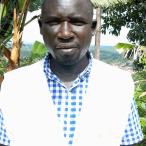 Every day, my team is dispatched in different groups. Some work closely with the contact tracers and try to prevent resistance by the communities. If they have the right information, we reduce fear, and people are more transparent about potential contacts. The second team is attached to the field investigators by the MOH. If there is an alert about a potential case in the communities, they visit the place to gather the details.Alunga Tom, Health Promoter
Every day, my team is dispatched in different groups. Some work closely with the contact tracers and try to prevent resistance by the communities. If they have the right information, we reduce fear, and people are more transparent about potential contacts. The second team is attached to the field investigators by the MOH. If there is an alert about a potential case in the communities, they visit the place to gather the details.Alunga Tom, Health Promoter
- Testimony of an Ebola-survivor - "We need to go to the people and teach them ... You can survive Ebola."
At first, I felt my temperature was high and after a day I started to get diarrhea – those were my signs. Then I called the ambulance, and they took me to hospital where I was checked. I had Ebola.
I was not expecting that it could be Ebola. I lost my mother and we buried her. After that, I went to the neighboring village. I think that is where I got the disease.
When I reached the hospital, things were not good. People were vomiting, they had diarrhea, others had blood coming from their nose, ears, eyes. I was afraid that I am going to die.
What I can say is that the disease is real, and it is very dangerous. When it attacks you, you lose the appetite of drinking, even eating. There is a way it destroys your body. You don’t feel anything – you can’t walk, you can’t sit. It took five days for me to be fine again.
When I was in the hospital, some people were calling me and saying the doctors would remove your organs, but I said no, that’s not true. Others called me and said they don’t give you food there, how do you survive? But it is not true. They give us food, breakfast, lunch and supper. Everything is for free.
My husband and son were also affected. Just when I was ready to leave the hospital, they brought them as well. So I stayed there again for five days with my son. Now he and my husband are also fine. The doctors treated them as well. My son is now fine, he is playing again.
I felt good reaching home after the hospital. When others are dying, you have to feel good, when you survive. But now people are running from me when I meet them on the road. They run away because they think I could affect them.
We need to go to the people and teach them. They don’t know how Ebola is spread. They do not know that if someone has Ebola, it does not mean that they have to die. People can get well again. And those people who have had Ebola, the moment they leave the hospital, they are ok. Don’t run, don’t discriminate them, don’t talk about them – they are also fine like you.
What I can tell people: The moment you do not feel well, go to the hospital. You can get better. You can survive Ebola.
There is a big need for information, especially if a person shows Ebola-symptoms and needs to be evacuated: to reassure the family of the patient, to avoid rumors but also to prepare contact tracing straight away. Additionally, a third team called “flying health promoters” are deployed if special needs are identified during the outreach activities. These needs could either be psychosocial support or social support in case basic food items are required in a household, for example if people are self-isolating after having been identified as contacts.
Information is needed to prevent Ebola but even beyond that. Survivors face strong stigmatisation once they leave the ETCs or ETUs. People fear them and keep their distance which can create tensions and often also leads to marginalisation of the survivors. Regina is convinced, there is still a long way to go
